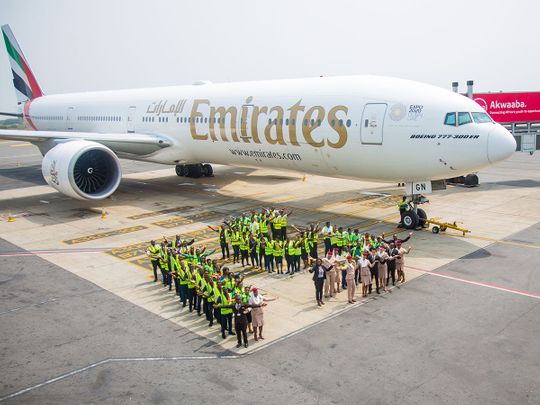Emirates Group records full year profit of Dh1.7 billion

Emirates Group posted a profit of Dh1.7 billion ($ 456 million) for the financial year ended 31 March 2020, down 28 per cent from last year.
Image Credit: Emirates
Dubai: Emirates Group posted a profit of Dh1.7 billion ($ 456 million) for the financial year ended March 31, 2020, down 28 per cent from last year.
The Group’s revenue reached Dh104.0 billion, a decline of 5 per cent over last year’s results. The Group’s cash balance was Dh25.6 billion, up 15 per cent from last year mainly due to a strong business performance up to February 2020 and lower fuel cost compared to previous year.
Due to the unprecedented business environment from the ongoing pandemic, and to protect the Group’s liquidity position, the Group has not declared a dividend for this financial year after last year’s dividend of Dh500 millio to the Investment Corporation of Dubai.
“For the first 11 months of 2019-20, Emirates and dnata were performing strongly, and we were on track to deliver against our business targets. However, from mid-February things changed rapidly as the COVID-19 pandemic swept across the world, causing a sudden and tremendous drop in demand for international air travel as countries closed their borders and imposed stringent travel restrictions,” said Sheikh Ahmed bin Saeed Al Maktoum, Chairman and Chief Executive, Emirates Airline and Group.
32nd consecutive year of profit
Despite the challenges, Emirates and dnata delivered our 32nd consecutive year of profit, due to healthy demand for our award winning products and services, particularly in the second and third quarters of the year, combined with lower average fuel prices over the year.
“Even without a pandemic, our industry has always been vulnerable to a multitude of external factors. In 2019-20, the further strengthening of the US dollar against major currencies eroded our profits to the tune of AED 1.0 billion, global airfreight demand remained soft for most of the year, and competition intensified in our key markets.”
In 2019-20, the Group collectively invested Dh11.7 billion (US$ 3.2 billion) in new aircraft and equipment, the acquisition of companies, modern facilities, the latest technologies, and employee initiatives, a decrease following last year’s record investment spend of Dh14.6 billion. It also continued to invest resources towards supporting communities, environmental initiatives, as well as incubator programmes that nurture talent and innovation to support future industry growth.
Emirates performance
Emirates’ total passenger and cargo capacity declined by 8 per cent to 58.6 billion ATKMs at the end of 2019-20, due to the DXB runway closure capacity restrictions and COVID-19 impact with a complete suspension of passenger services as directed by the UAE government during March 2020.
Emirates received six new aircraft during the financial year, all A380s. During 2019-20, Emirates phased out six older aircraft comprising of four Boeing 777-300ERs, its last 777-300 and one Boeing 777 freighter leaving its total fleet count unchanged at 270 at the end of March. Emirates’ average fleet age remains at a youthful 6.8 years.
It reinforces Emirates’ strategy to operate a young and modern fleet, and live up to its “Fly Better” brand promise as modern aircraft are better for the environment, better for operations, and better for customers.
During the year, Emirates launched three new passenger routes: Porto (Portugal), Mexico City (Mexico) and Bangkok-Phnom Penh. It also supplemented its organic network growth with a new codeshare agreement signed with Spicejet that will provide Emirates customers with more connectivity options in India.
Challenges ahead
Emirates expects the COVID-19 pandemic to have a huge impact on aviation industry across the world and the company’s performance during the current year.
“The COVID-19 pandemic will have a huge impact on our 2020-21 performance, with Emirates’ passenger operations temporarily suspended since 25 March, and dnata’s businesses similarly affected by the drying up of flight traffic and travel demand all around the world. We continue to take aggressive cost management measures, and other necessary steps to safeguard our business, while planning for business resumption,” said Sheikh Ahmed.
The airlne expects it will take 18 months at least, before travel demand returns to a semblance of normality. “In the meantime, we are actively engaging with regulators and relevant stakeholders, as they work to define standards to ensure the health and safety of travellers and operators in a post-pandemic world. Emirates and dnata stand to reactivate our operations to serve our customers, as soon as circumstances allow,” said Sheikh Ahmed.


Comments